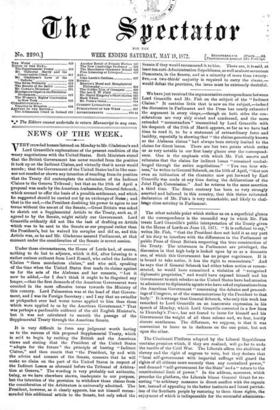We have just received the argumentative correspondence between Lord Granville
and Mr. Fish on the subject of the " Indirect Claims." It contains little that is new on the subject,—iudeed the discussion in Parliament and the Press has nearly exhausted the argument in every shape,—though on both sides the con- siderations are very ably stated and condensed, and the more extended " memorandum" transmitted by Lord Granville with his despatch of the 20th of March appears, so far as we have had time to read it, to be a statement of extraordinary force and lucidity, especially in showing that " the claims generically known as the Alabama claims" had always been strictly limited to the claims for direct losses. There are but two points which strike us as very notable in our first hasty glance over the correspond- ence. One is the emphasis with which Mr. Fish asserts and reiterates that the claims for indirect losses " remained unchal- lenged through the entire negotiations." "You can bear wit- ness," he writes to General Schenck, on the 16th of April, "that not even an intimation of the character now put forward by Earl Granville was made at any time during the deliberations of the Joint High Commission." And he returns to the same assertion a third time. The direct contrary has been so very strongly asserted and believed in this country, that this thrice reiterated declaration of Mr. Fish's is very remarkable, and likely to chef- loge close scrutiny in Parliament.


































